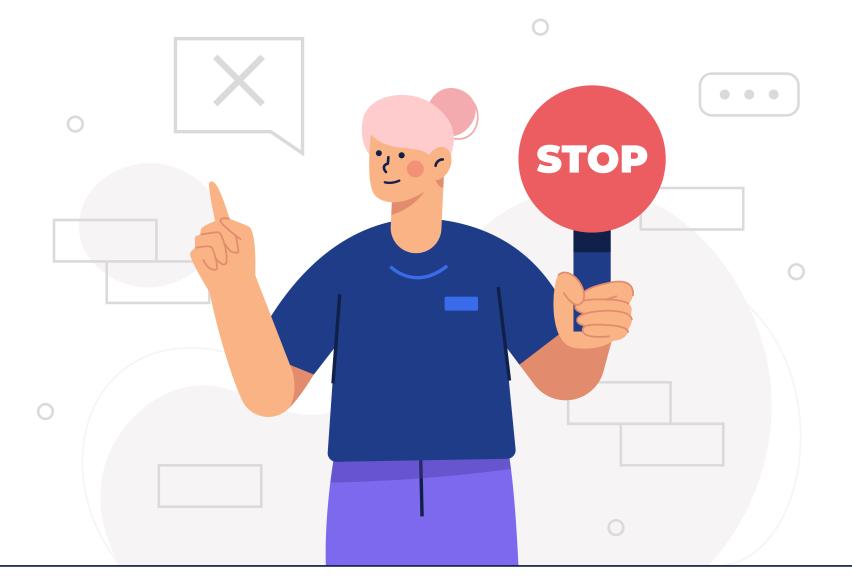“Just Stop”: When Words Hurt More Than Heal

Online test
Find out the severity of your symptoms with this free online test
“Stop pulling your hair.”
“Why can’t you just STOP?”
If you pull your hair, you’ve no doubt heard comments like this more than once. While well-intentioned, they’re not helpful. And, more importantly if you could stop, you would. If it were that easy, everyone would “just stop”.
Despite common assumptions, repetitive hair pulling is more than just a “bad habit”. It’s not an attention-seeking behavior. It’s not defiance.
Compulsive hair pulling, known as trichotillomania (TTM), is a mental health disorder characterized by compulsive hair pulling that results in significant hair loss, emotional distress, and impaired psychosocial functioning. TTM is a body-focused repetitive behavior (BFRB) that is categorized as an Obsessive-compulsive Related Disorder (OCRD). It is a chronic and pervasive disorder that can have severe physical and emotional effects for the person. Treatment is available but the condition is often chronic, waxing and waning over time.
For someone living with TTM, the desire to stop and the frustration that comes with trying to resist urges to pull can create considerable emotional distress. While others may be well-intentioned, being told to “just stop” can be quite hurtful and maybe even exacerbate the behavior you’re trying to stop.
The Science Behind “Just Stop”
Have you ever noticed that when someone tells you to “just stop” doing something, it can feel like the urge to do it (whatever “IT” is) seems to intensify? Like you want to do it? Need to do it? You’re not imagining that feeling.
There’s a reason that we tend to want to do what we are told not to, and it has nothing to do with defiance or willpower. It’s based on something called reactance.
Reactance theory is based on the idea that when someone feels that their free will or autonomy is threatened by rules or demands or advice, they are motivated to protect their autonomy or freedom to choose. That forbidden fruit” becomes highly desirable and maybe even irresistible. As a result, people often do the very thing they’re told not to.
We see this phenomenon play out in all kinds of situations:
- People with addictions will often drink or use more when told to “just quit”.
- Kids will touch the glass figurine you told them not to touch.
- Sneaking to watch that movie or TV show mom and dad have forbidden.
It’s not about defiance. It’s about the need to feel in control.
Now, pulling urges and behavior are not caused by psychological reactance. However, for people living with hair pulling, being told to “just stop” may make that struggle just a bit harder.
The Experience of Just Stop
It’s one thing to know about TTM but to understand the experience of living with TTM, there’s no better resource than those who live with it every day. There are many courageous individuals who are open about their struggles and share their experiences on various platforms and forums.
For some, the experience of being told to stop pulling was very direct. For others, it came in the form of minimizing the behavior as simply a “habit” or not being seen as needing treatment, punishments, unkind remarks, or even “scare” tactics of being taken to the doctor. The underlying message was that the behavior was inappropriate. One person described their experience as feeling as though they’d done something wrong or dirty. While well-intentioned, these responses from others created more distress.
When faced with being told to “just stop” pulling, it’s not uncommon for people to report that it increases their distress and urges to pull. While the exact cause of TTM is unknown, it is generally accepted that TTM is a self-soothing response for coping with uncomfortable or distressing emotions and can be exacerbated by anxiety and stress.
A person living with TTM already knows that their hair pulling behavior is not the “norm” and over time, having attention called to it can exacerbate feelings of shame, guilt, and embarrassment. In fact, feelings of shame have been found to increase urges in people living with a BFRB.
Knowing that others may judge them is also a common theme associated with the shame and guilt associated with BFRBs. The fear of being judged is a factor in the social isolation and attempts to hide their condition that often accompanies hair pulling and other BFRBs. Surveys have found that shame, embarrassment, and disgust seemed to be exacerbated by social interactions. Worries fall along two main dimensions:
- Participants reported feeling self-conscious about their appearance which led to social avoidance and attempts to conceal the visible damage. Some worried that others would think they were infectious or lacked self-control.
- Feeling misunderstood led to frustration and a reluctance to seek help. They also reported feeling relief when they felt understood by others.
What Helps
Seeking help can be a difficult decision when there is the worry of being judged but it can be helpful. Many people living with TTM and other BFRBs report that treatment has helped them. What that treatment looks like has varied:
- Some have found help in therapy such as cognitive behavioral therapy.
- Others have found that treating their co-occurring disorders such as depression or anxiety has helped reduce their hair pulling symptoms.
- Still others have found help using online resources and self-help.
The important thing to know is that there is effective treatment available with therapists who understand TTM and can help you learn ways to manage it. There are supportive communities of people who understand your experiences because theirs are similar.
Whether you decide to try it on your own or seek therapy, know that you can heal. You can learn how to manage your trich. Seek out the resources that are right for you and seek support. There is community. There is help. There is hope.
References
1. APA dictionary of psychology. (n.d.). APA Dictionary of Psychology. https://dictionary.apa.org/reactance-theory?ref=luatkhoa.com
2. Reddit. (n.d.). Reddit - Dive into anything. https://www.reddit.com/r/insaneparents/comments/iqt47x/i_have_trichotillomania_my_mom_just_noticed_the/
3. Houazene, S., Leclerc, J., O’Connor, K., & Aardema, F. (2021). “Shame on you”: The impact of shame in body-focused repetitive behaviors and binge eating. Behaviour Research and Therapy, 138, 103804. https://www.sciencedirect.com/science/article/abs/pii/S0005796721000036
4. Anderson, S., Clarke, V., & Thomas, Z. (2022). The problem with picking: Permittance, escape and shame in problematic skin picking. Psychology and Psychotherapy: Theory, Research and Practice, 96(1), 83-100. https://bpspsychub.onlinelibrary.wiley.com/doi/10.1111/papt.12427
Online test
Find out the severity of your symptoms with this free online test
Start your journey with TrichStop
Take control of your life and find freedom from hair pulling through professional therapy and evidence-based behavioral techniques.
Start Now



